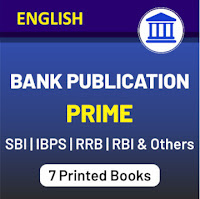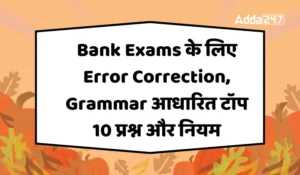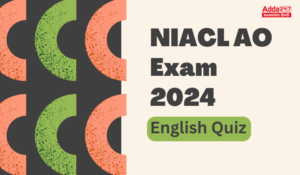SBI Clerk Mains English Language Quiz
Directions (1–5): Read the following passage carefully and answer the questions given below it. Certain words have been printed in bold to help you locate them while answering some of the questions.
What is the function of transportation? What place does locomotion occupy in the whole spectrum of human needs? Perhaps, the first step in developing an adequate transportation policy would be to clear our minds of technocratic cant. Those who believe that transportation is the chief end of life should be put in orbit at a safe lunar distance from the earth. They are probably living in their make-believe world by placing so much importance to transportation itself.
Though the physical movement of people and goods is an important function of transportation, the prime purpose of passenger transportation is not to increase the amount of physical movement but to increase the possibilities for human association, cooperation, personal intercourse, and choice.
A balanced transportation system, accordingly, calls for a balance of resources and facilities and opportunities in every other part of the economy. Neither speed nor mass demand offers a criterion of social efficiency. Hence such limited technocratic proposals as that for high-speed trains between already overcrowded and overextended urban centers would only add to the present lack of functional balance and purposeful organization viewed in terms of human need. Variety of choices, facilities and destinations, not speed alone, is the mark of an organic transportation system. And, incidentally, this is an important factor of safety when any part of the system breaks down. Even confirmed air travelers appreciate the railroad in foul weather.
If we took human needs seriously in recasting the whole transportation system, we should begin with the human body and make the fullest use of pedestrian movement, not only for health but for efficiency in moving large crowds over short distances. The current introduction of shopping malls, free from wheeled traffic, is both a far simpler and far better technical solution than the many costly proposals for introducing moving sidewalks or other rigidly automated modes of locomotion. At every stage we should provide for the right type of locomotion, at the right speed, within the right radius, to meet human needs. Neither maximum speed nor maximum traffic nor maximum distance has by itself any human significance.
With the over-exploitation of the motor car comes an increased demand for engineering equipment, to roll over wider carpets of concrete over the bulldozed landscape and to endow the petroleum magnates of Texas, Venezuela and Arabia with fabulous capacities for personal luxury and political corruption. Finally, the purpose of this system, abetted by similar concentration on planes and rockets, is to keep an increasing volume of motorists and tourists in motion, at the highest possible speed, in a sufficiently, comatose state not to mind the fact that their distant destination has become the exact counterpart of the very place they have left. The end product everywhere is environmental desolation.
If this is the best our technological civilization can do to satisfy genuine human needs and nurture means further development, its plainly time to close up shop. If indeed we go farther and faster along this route, there is plenty of evidence to show that the shop will close up without our help. Behind our power blackouts, our polluted environments, our transportation breakdowns, our nuclear threats, is a failure of mind. Technocratic anesthesia has put us to sleep. Results that were predictable and predicted! half a century ago without awakening any response still find us unready to copy with them or even to admit their existence.
Q1. According to the article, the reframing of the transportation system would require
Q2. It is stated in the article that safety in transportation is aided by the existence of
Option (a) is incorrect because it is not mentioned anywhere in the passage.
Option (b) is incorrect because the author does not refer to technological sophistication.
Option (d) is incorrect because the author does not discuss fool-proof systems anywhere.
Option (e) contradicts the views of the author who believes that speed alone is not the mark of an organic transport system.
Q3. The word comatose means:
Q4. Choose the word/group of words which is most similar in meaning to the word “Abet” as used in the passage.
Abet means to encourage or assist (someone) to do something wrong. Hence it has the same meaning as succour.
Pertinent means relevant or applicable to a particular matter.
Plausible means seeming reasonable or probable.
Apportion means divide up and share out.
Assent means approval.
Q5. Choose the word/group of words which is most opposite in meaning to the word “Desolation” as used in the passage.
the opposite meaning to elation.
Q6. ALTHOUGH
(A) I spend much of lunch surreptitiously looking up on my phone for translations for “once upon a time” and “total eclipse of the heart”.
(B) According to the language app on my phone, I am 61% fluent in Italian, but it doesn’t feel that way when I am dispatched to book a table in a mountaintop restaurant.
(C) Sitting on a lift on a bright, cold morning, I look below at all the people carving elegant turns through last night’s new-fallen snow, and I think: idiots
(D) It is against the rules to use your phone at lunch.
Q7. NOTWITHSTANDING
(A) Australia’s central bank chief Philip Lowe reinforced that a return of rapid wage growth remains a distant prospect despite strengthening business investment and a hiring bonanza.
(B) The governor kept interest rates unchanged at 1.5 percent on Tuesday, as expected.
(C) The Reserve Bank of Australia has opted to be a steadying influence on the economy, keeping rates at a record-low for 18 months to encourage firms to expand and take on new employees, a strategy that’s paying some dividends.
(D) Interest rates were unchanged by the governor as with the improving labor market, wage growth remains low.
Q8. AS MUCH AS
(A) Chaplin co-founded the distribution company United Artists, which gave him complete control over his films.
(B) Chaplin was scouted for the film industry and began appearing in 1914 for Keystone Studios.
(C) Charlie Chaplin was an English comic actor, filmmaker, and composer who become known for his shooting in the era of silent films.
(D) Charlie Chaplin became famous for his shooting for almost fifty times the amount of film footage necessary in order to satisfy his artistic vision.
Q9. RATHER THAN
(A)
David Vincent Akins who was convicted last week of four counts of aggravated sexual assault of a child opted to let a judge render his punishment.
(B) Akins was arrested in 2016 after his former landlord reported finding child pornography on his computer.
(C) David Vincent Akins who is 38-year-old adjudged for sexual assault of a child decided not to be judged by a jury.
(D) A Texas man was sentenced to four consecutive life sentences after being convicted of filming the rape of a 3-month-old child.
Q10. HOWEVER
(A) India and Pakistan have not played a full bilateral series since 2007-08.
(B) Pakistan toured India for a short limited-overs series in 2012-13.
(C) Kohli has played Pakistan in 12 one-day internationals and maintains a healthy average of 45.90 scoring 459 with the help of two centuries and a fifty.
(D) MS Dhoni, Yuvraj Singh, Harbhajan Singh, Gautam Gambhir and Dinesh Karthik are only other active players to have played in or against Pakistan in Test cricket.
Directions (11-15): Pick out the word opposite or nearly so in the meaning of the given words.
Q11. EXHILARATE
Exhilarate means make (someone) feel very happy, animated, or elated hence depress is the word which is most opposite in meaning.
Q12. EXHUME
Exhume means to dig out (something buried, especially a corpse) from the ground hence entomb is the word which is most opposite in meaning
Q13. EXALT
Exalt means to raise to a higher rank or position.
Depreciate means to disparage or belittle (something).
Q14. OSTRACISE
Ostracise means exclude from a society or group.
Exclude means deny (someone) access to a place, group, or privilege.
Q15. OBSTREPEROUS
Obstreperous means noisy and difficult to control.
- Tips and Tricks To Solve Cloze Test Questions For Bank and Other Competitive Exams
- Conjunctions: English Language Notes for Bank and Other Competitive Exams





 Practice for English Section: 15 Cloze T...
Practice for English Section: 15 Cloze T...
 Bank Exams के लिए Error Correction, Gram...
Bank Exams के लिए Error Correction, Gram...
 English Quiz For NIACL AO Mains 2024 Exa...
English Quiz For NIACL AO Mains 2024 Exa...










